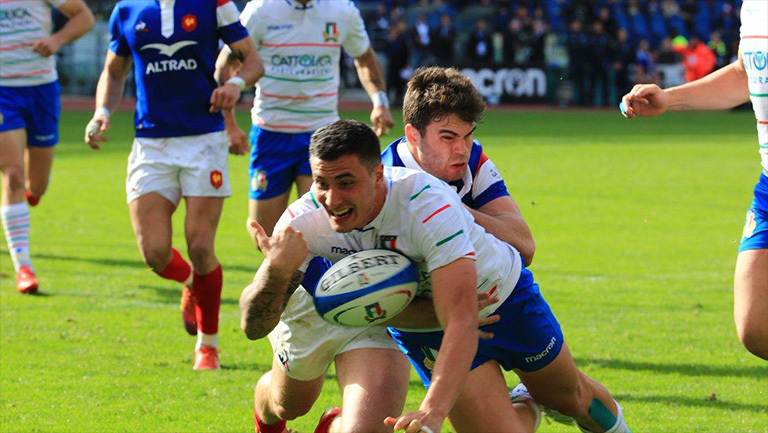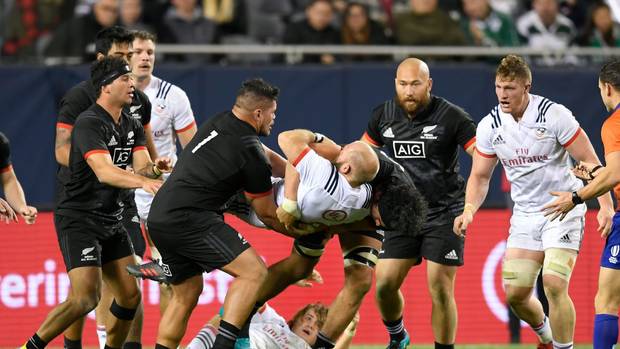World Rugby Approves Controversial New Tackle Law Trial
Latest posts by Will Matthews (see all)
- Six Nations agree monumental new broadcast deal - March 15, 2025
- Six Nations 2025 – All the action from Round Five of the Championship - March 14, 2025
- Ireland team named for Six Nations finale with Italy - March 13, 2025
Trials.
World Rugby’s Executive Committee has announced they have approved a package of law amendments for closed trial, including a controversial trial to reduce the tackle height to the waist.
The Committee approved six law trial proposals submitted by unions and developed at the ground-breaking player welfare and laws symposium in Marcoussis, Paris, in March.
The core focus of the project is the tackle, which is responsible for 50 per cent of all match injuries and 76 per cent of all concussions (72 per cent occurring to the tackler).
The package of trials will be rolled out as designated closed trials in competitions around the world and if successful, would be recommended for global trial within the next Rugby World Cup cycle, meaning Rugby World Cup 2023 could be the first global showpiece to feature law amendments fully aimed at reducing injury risk.
The approved package of six law amendments for trial are:
50:22 kick: If the team in possession kicks the ball from inside their own half indirectly into touch inside their opponents’ 22, or from inside their own 22 into their opponents’ half, they will throw in to the resultant lineout.
Rationale: To create space by forcing players to drop back out of the defensive line in order to prevent their opponents from kicking for touch. Approved for closed trial in the National Rugby Championship (NRC) in Australia
The High Tackle Technique Warning: This has been successfully trialled at the World Rugby U20 Championship for the last two years, reducing the incidence of concussion by more than 50 per cent
Rationale: Head Injury prevention strategy. Approved for further closed trials
Reducing the tackle height to the waist.
Rationale: Forcing players to tackle lower may reduce the risk of head injuries to both the tackler and tackled player. Approved for closed trials
Ability to review a yellow card when a player is in the sin-bin for dangerous foul play.
Rationale: To ensure players who are guilty of serious foul play do not escape with a yellow card when they deserved red. Approved for closed trials
The introduction of an infringement (penalty and free-kick) limit for teams: Once a team has reached the limit, a mandatory yellow card is given to the last offending player as a team sanction.
Rationale: To encourage teams to offend less. Approved for closed trial in the National Rugby Championship in Australia.
The awarding of a goal-line drop-out to the defending team when an attacking player, who brings the ball into in-goal, is held up.
Rationale: To reward good defence and promote a faster rate of play. Approved for closed trial in the National Rugby Championship in Australia.
A further law trial was approved for implementation in the men’s and women’s HSBC World Rugby Sevens Series from the next season:
One additional replacement per team to be allowed during extra-time in a sevens match.
Rationale: To manage player fatigue and workload. Approved for closed trial in the HSBC World Rugby Sevens Series and HSBC World Rugby Women’s Sevens Series
In addition to the approved trials, the Executive Committee ratified the recommendation of the Rugby Committee, instructing further evaluation in the following areas:
- Reduction in the number of permitted substitutions
Rationale: To encourage more space and opportunities towards the end of the game as on-field players tire.
World Rugby to sponsor more research to determine if there is a player welfare benefit. - Off feet at the ruck – players must move away from the ball without delay.
Rationale: To ensure more space and time is afforded to the attacking side. Specialist working group to be formed to assess all issues regarding the ruck and breakdown
A number of unions have expressed an interest in operating one or more of the approved trials in their domestic or cross-border competitions: Rugby Australia in the NRC this year; FFR at all community levels; Georgian Rugby Union domestic leagues; Fiji Rugby Union domestic leagues; the Americas Rugby Championship; SA Rugby in the Currie Cup and the FIR domestic leagues. Further details will be confirmed shortly.




